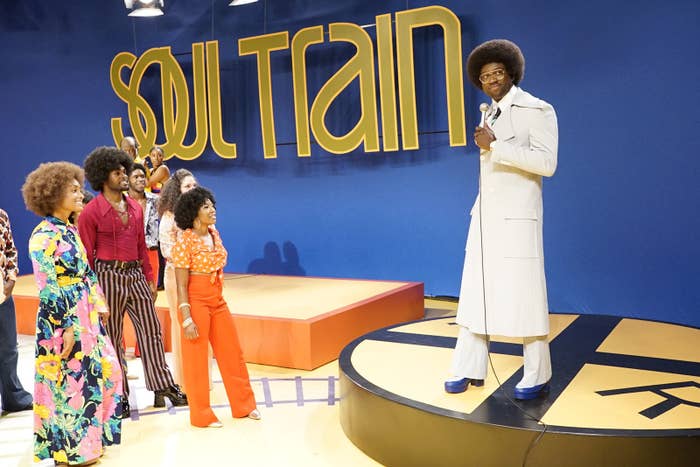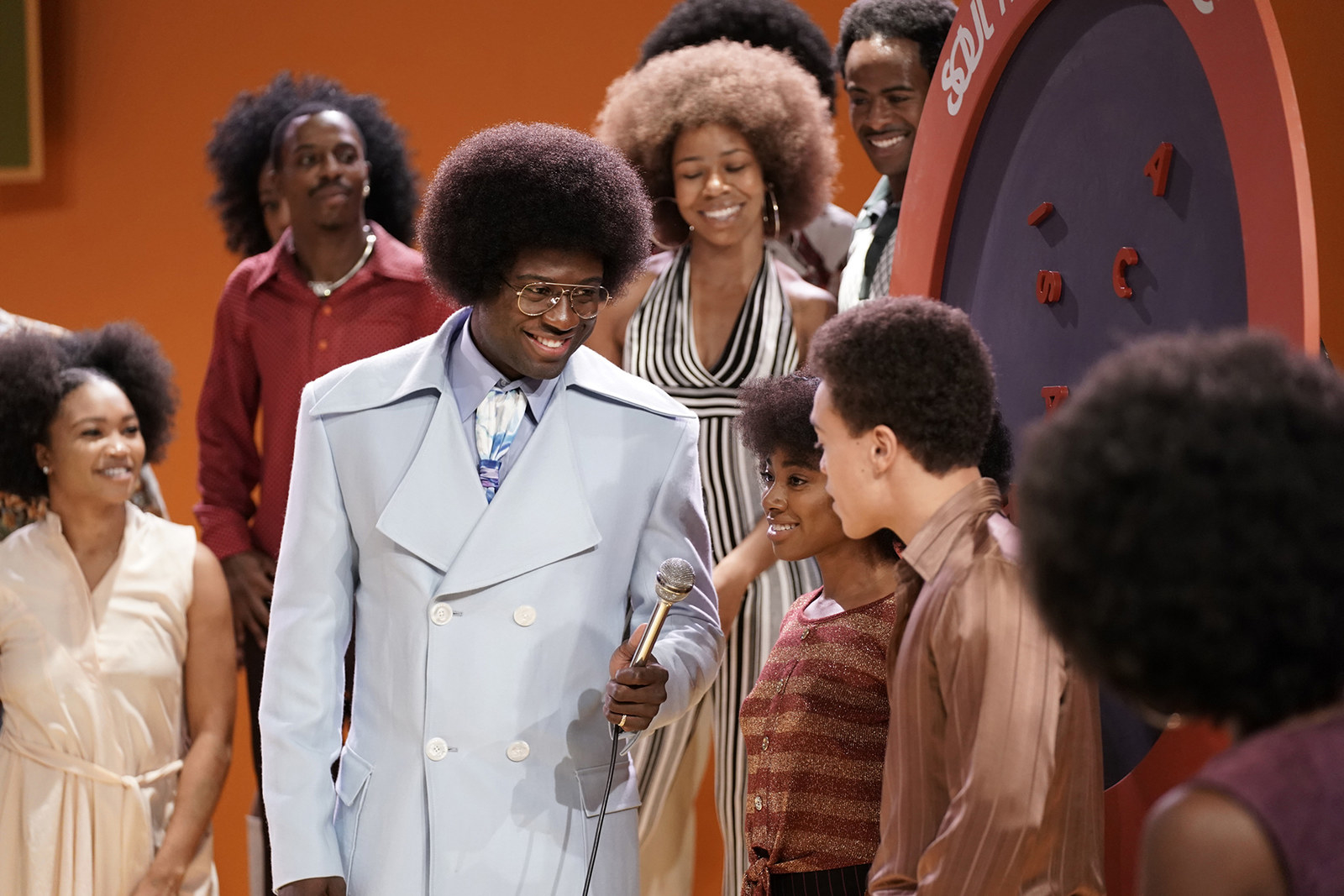
It's the final week of Brooklyn Museum's "Soul of a Nation: Art in the Age of Black Power" exhibition. Sinqua Walls sits on a bench surrounded by work from The Spiral Group, a New York-based Black artist collective whose short-lived existence (1963-1965) forshadowed the Black Power Movement. There hung Norman Lewis' abstract rendition of a Klu Klux Klan rally ("America the Beautiful," on loan from Spike and Tonya Lewis Lee); Reginald Gammon's acrylic reimagining of the 1963 March on Washington, and Spiral founder Romare Bearden's sweeping photomontage of a vibrant Harlem neighborhood ("The Dove"), among others. But Sinqua isn't looking at the art work. He's looking at me.
It's with this same exhaustive brand of focus that Sinqua dissects his roles, whether it's Jamarcus Halls on Friday Night Lights, (television's first black) Sir Lancelot on Once Upon A Time, Shawn Stark on Power, or most recently the late Don Cornelius on BET's new series American Soul. How else could he portray the enigmatic Soul Train creator? "Subtleties," Sinqua says. "You weave them in organically, little moments."
One of those subtleties is staring. Don stares at the ground as his token white business partner Brooks Donald rags on his list of suggested performers. He stares at a silvery mirage of James Brown cutting up Soul Train's future LA-based stage as his flashlight reveals the vermin-ridden, trashed interior of an abandoned Hollywood Soundstage. And, as shown in the series' opening scene, Don stares at a televised performance of his friend Gladys Knight as he raises a loaded gun to his right temple and pulls the trigger.
"At the time no one thought he was staring. They probably thought [Don] was waiting on something," Sinqua explains. "But [as a viewer] you realize he's going into a mental state. He's discovering problems that he wouldn't have known about because they weren't defined at the time." Sinqua's nuanced portrayal of a troubled African-American icon responsible for creating the first ever black-owned nationally syndicated TV franchise results in a gradient portrait worthy of its own place beside the revolutionary works of art encircling the actor that afternoon.
Audiences and critics go crazy for these kinds of theatrical transformations, the ones were the actor hurls themselves into the depths of another person. It's a "joyous feeling," Sinqua admits, but not one worth losing himself: "I know that's so existential to say but all artists have an ability to throw themselves in it, but you wanna make sure that you're throwing yourself in it, but also being healthy and serving yourself at the same time." And so he tethers himself to the lessons of humility and compassion instilled in him by his grandmother, the " support system of good people" he keeps close by prioritizing phone calls over DMs, and a medley of self-care practices, including yoga, meditation, and prayer. Here's what else the American Soul actor has to say on his new role, his favorite actors, his relationship to social media, and his self-care practices:

On becoming Don Cornelius:
I saw one episode of Soul Train where the camera cut away from Don, you know throwing the camera to an artist. But, before they cut away, I saw him put his head down and then furrow his brow and quickly go [Sinqua makes a mental calculation] and then look back up, and I said "That's the man. He's got something on his brain." He probably saw something on the other end of the camera and thought, "I need to go fix it and I'm gonna wait 'til they cut away." It could be the camera. It could be the lighting. It could be the next dance segment. It could be, "Did we book that host; did we pay that bill; is catering gonna be good enough? Is craft service?" It could be all those things. So that whenever another character approached me in a scene to ask me a question, I'd naturally go "What's your problem?!" because they interrupted my train of thought and whenever Don was angry or frustrated, he'd react, which we see in the series. That's why I'd always make sure I had at least one thought on my brain, because Don was focused on so many things at once. And hopefully the audience feels that as well.
On the possible dangers of throwing himself into a role:
Anytime you dive into a character, there's always that fear of whether you're gonna lose yourself, your truth, and your humanity and not come back. The goal is to be so authentic that people believe you are the person or see the essence of the person in you, but if you go too far where does YOU begin to chip away and no longer exist? So when people say that [I become Don Cornelius], on the one hand I feel like I'm doing this character justice and I'm honoring him, but on the other hand, how can I come back? I'm doing a good job, how do you make sure that I'm doing a good job to self? So it's always just making sure that as I grow as an actor, I understand what systems I need to put in place to make sure that I can always come back to me at the end of the day and put these characters away.

On practicing self-care and maintaining his mental health:
I do yoga, I meditate, and I pray. I always pray to be conscious enough to embrace the present and honor whatever blessings I'm given, to let the people that I see know that I see them. [I don't want them to] ever mistake that I don't love or care enough. That's really important to me because as we grow, the joy of an experience is not where you go, but who you go with. So I make sure that I surround myself with good energy and good people. And, look, we all have good days, we all have bad days, but that's the focus at all times.
On going to therapy:
Yes and I think that it's a good thing. I went to therapy and I promote going to therapy at all times for people because sometimes it can just help you through things. You can talk to someone whose job it is to listen and help you figure out your issues. We all carry things from somewhere—adulthood, childhood, two days ago—and sometimes you just need the tools to work through it. I always promote mental health to my friends and other black men.
On why he only follows 22 people on Instagram:
I'm a big believer of phone calls and texts. I feel like we get lost in the world of social media where we no longer use it as a tool, but as a crutch sometimes; and instead of checking in on people, we look at their Instagram. But if I'm only looking at your Instagram page, I'm not checking in on you. Your life could look good, but you could also be struggling. People sometimes say, 'You don't follow me. We're not friends!' And I'm like, no, I actually want to talk to you and hear from you. I've got boys [who are also working actors] and we'll have check-ins and be like 'Hey bro, I love you. What's going on?' In [the black] community a lot of times we don't say 'Ay bro, I love you. What's going on? Let's hop on the phone real quick. I just wanna check-in on you.'" I just wanna make sure I'm building deeper relationships with people because I care about people and I want people to care about me.
That's why I mostly follow accounts based on my interests, like [tiny homes, motorcycles, art, and healthy eating], and then tell my friends and loved ones, "Hey! Hit me and I'll hit you back." I don't have a problem with [Instagram] and as I grow I will follow more people. Social media is a phenomenal tool and it's here to stay, but go the extra mile and check-in. It's not enough just to like a photo. Make sure that person is good. And what I learned from American Soul and just what Don was going through mentally is that no one was checking in as much as they maybe needed to. And that educated people now on how to check in more. So do not be naive to that and check-in.

